Justin Robinson's Blog, page 4
August 26, 2016
Yakmala: Swimfan

“I blue your movie.” “There’s got to be a better way of saying that.”
Back in my office working days, my old boss was perusing the newspaper, hunting for a movie he’d like to see. He asked his wife if she was interested in seeing “the fish movie.” After about thirty minutes, an enigma machine we’d seized from the Germans, a visit from Jessica Chastain’s 30 Dark Thirty character, and someone willing to read tea leaves, goat entrails, and all our horoscopes, we realized he meant Swimfan. In case you’re wondering, there’s nary a fish in this one. Then again, my boss was insane, which is a big reason I don’t work for him anymore.
Tagline: Wanna pretend that never happened?
More Accurate Tagline: Whenever a movie’s tagline issues a third degree burn like that one, I’d be a fool to try to top it.
Guilty Party: Back in the late ‘90s and early ‘00s, the market was a lot like the guidelines for Albanian human traffickers: all teens, all the time. Studios made teen movies, they adapted Shakespeare into teen movies, and in this tail end of the trend, they remade other movies into teen movies. I’m blaming whichever executive watched Fatal Attraction and decided it needed to be remade for the Dawson’s Creek set.
Synopsis: Ben Cronin (Jesse Bradford) has the perfect life. He’s the big man on campus despite being a shade over five feet tall, he’s an inhumanly great swimmer, and he even has the perfect girlfriend Amy (Shiri Appleby). Turns out, though, he wasn’t always the overachieving merman we see before us. No, in the nebulous past, he had drug problems and a stealing habit that led to a stint in juvie. That’s where, in his gritty origin story, he started to swim competitively. There’s a lot of swimming in juvie. Just one of those things.

Have to get away from the Dementors somehow.
Everything goes pear-shaped when new girl Madison (Erika Christensen) shows up and decides that she needs to get Ben up in her pronto. It’s like she has a vagina-powered proximity sensor or something. They meet when he helps her by picking her locker door open, and she decides that any dirtbag with a speedo and housebreaking skills is marriage material.
Later on, he gives her a ride home, and she “accidentally” leaves her journal behind. He takes it back to her, and it becomes an impromptu date. He tries to pawn her off on his pal Josh — the Ryan Lochte to his Michael Phelps — but she’s not into it. At the end of the date, she seduces him in the school’s swimming pool, which is going to result in an unpleasant surprise for whoever has to swim in that lane the next day.
She quickly turns out to be a total stalker. Which he should maybe have put together earlier, but in fairness, I don’t know how smart Ben is supposed to be. Still, when he gets a thousand email messages all from “SwimFan85,” he connects the dots pretty quick. He does his best to keep her at arm’s length, but she won’t let up, and eventually, he’s got to break up with her. Anyone who’s seen the source material knows what happens next. Madison goes crazy. Or maybe she doesn’t go crazy so much as return to crazy after a short vacay.
Madison devotes her life into ruining Ben’s. Which is really inspiring. It just goes to show that you can do anything you set your mind to. She starts dating Josh, because fuck it, merman genes, then kills him after he catches her calling him “Ben” while making out. She gets Ben fired from his hospital job by switching medications on patients, gets him kicked off the swim team by planting steroids on him, tells Amy about the affair, frames him for Josh’s murder, then frames him for running Amy down on the road. The cops are probably wondering why Ben decided to play all these unlocked Saint’s Row missions in real life.
Ben goes all Hardy Boys on her. He breaks into her house, which leads to a shaky alliance with her cousin, who might or might not be mentally disabled. He could also just be a nerd. I’m pretty sure this movie thinks that anyone who cracks a book is a potential serial killer. Anyway, the cousin first helps Ben track down Madison’s ex, who is in a coma, then catches her with a pretty effective sting.
Madison escapes police custody so quickly, I don’t know why they bothered in the first place. Seriously, they don’t even get her to the station. Sheds some light on why they had trouble with Ben. So she kidnaps Amy and the three of them have a showdown at the pool. Ben rescues Amy and drowns Madison, who despite being a Swimfan, can’t swim. Oh, cruel irony!
The movie ends with Ben’s life in better shape. He’s still off the swim team, he has no job, but he’s with Amy. I sound like Luis talking about how he got the van in Ant-Man, so I’ll stop.
Life-Changing Subtext: Never tell a woman you love her.
Defining Quote: Madison: “Tell her you love me, I know it!” Madison really likes being told she’s loved. She gets Ben to tell her that when they’re having sex, and gives him the escape valve, “you don’t have to mean it.” He says it, and man. It’s like a magic spell summoning the crazy. Dr. Jekyll goes to sleep, and here’s Mr. Hyde. I wonder if he was into swimming.
Standout Performance: Nick Sandow, most famous these days as Caputo from Orange is the New Black, is in one scene as a detective who amiably shakes Ben down. It’s the most understated, natural acting in the whole thing.
What’s Wrong: Swimfan was dated roughly 13 nanoseconds after it first showed on a movie screen. This is the most 2002 movie that has ever existed. In the future, if aliens want to know what it was like in 2002, all they’ll have to do is find a warehouse of unsold copies of this DVD and they’ll learn all about pagers, payphones, farting nu-metal, the auto-safety device The Club… and actually, I think this thing was already dated in the script stages. This film doubles as the death throes of the late ‘90s, only funnier.
Flash of Competence: I’ve always liked Shiri Appleby, and I make no apologies.
Best Scenes: On their initial date, Madison and Ben go to the pool for some reason while Madison watches him do laps. Then she gets into the pool in a bra and panties, and Ben knows this is a bad idea. The look on Bradford’s face through this scene is pretty priceless. He looks like a man staring down a tiger. “I know if I wrestle this thing, I get free pudding for the rest of my life… but that life might not be very long.” He ends up wrestling the tiger, but no pudding. It’s a lose-lose.
Amy has this maddening habit of being super vague. It’s like she knows what kind of movie she’s in and exists only to ratchet up the tension. You know, like we don’t want her to find out Ben’s a creep and she could do so much better. So she has lines that are like, “You’re so busted…” (cue Ben’s panicked face) “You forgot to study with me!” Or then there’s “You’re freaked out.” (ohshitohshitohshit) “The other night I was pushing you!” Goddammit, Amy! I’m pretty sure she’s killed multiple boyfriends via heart attacks this way. It’s how Amy weeds out the weak.
Transcendent Moment: I’ve been hinting around that Ben isn’t the sharpest shank in the prison informant. Seems like me being needlessly cruel. Here’s the thing, though. At one point, he hops into the pool, which is blazing with this blue-white light, like the aliens from The Abyss are about to surface under there and bring peace and tsunamis. He swims along until he runs right into Josh’s body. He doesn’t see it until his head literally makes a coconut sound as it collides with Josh’s skull. How did he miss that? I’d love to see Ben as the protagonist of a slasher movie, so in the last act, when all the corpses have been lovingly posed by the bad guy, Ben just wanders along by, totally oblivious until the slasher gets frustrated.
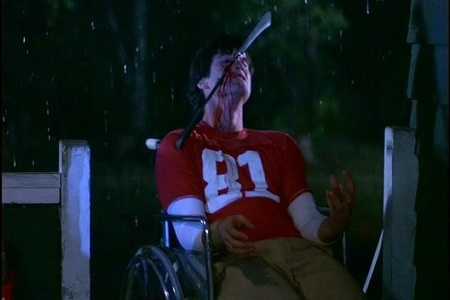
“You know what, Ben? I don’t even know why I’m bothering with you.”
Swimfan is silly and terrible, but it’s short. But just to be clear, and if my old boss is reading this: it has nothing to do with fish. People who swim. No fish. Still, it’ll always be the Fish Movie to me.
Filed under: Projected Pixels and Emulsion, Yakmala! Tagged: Erika Christensen, Fatal Attraction, Jesse Bradford, Not Julia Stiles, Pool death, Shiri Appleby, Swimfan, Yakmala!

August 19, 2016
Lifetime Theater: The Pastor’s Wife
Just like that I was out of it. I couldn’t view Gone Girl like it was intended: as a fun potboiler of a chess game between a psychopath and Ben Affleck. And sorry, anybody who saw that as a pitch for the next Batman movie, it has the word “fun” in it, so it’ll never happen. The point is that the movie, for a significant portion of the audience, just confirmed the myth that women lie about rape and abuse. Yes, I know, it does happen. But you know what happens a lot more? Like, a lot, lot more? Rape and abuse. And the vast majority of those go unreported. Worrying about false allegations like that is sort of like worrying about sharknados. In Wyoming.

“Looks like sharknado weather to me!” “Shut up, Steve.”
And yeah, this is me saying that if your story hinges on a woman lying about rape or domestic violence, it’s part of the problem. Sorry. It’s a dangerous myth that harms or even kills millions of women every year (and I would not be shocked if I was lowballing that number at all). That doesn’t mean that Gone Girl isn’t well-made and entertaining. It’s just well-made and entertaining garbage.
So you’d think that the network that’s supposedly so women-friendly its cycles sync up to those of its frequent viewers would do a little better, right? Well, they dropped the ball big time this week with The Pastor’s Wife. Although, some of that might be the weird tightrope that Lifetime walks.
We want to see the network through only a single lens. This is television for women. End of story. And, you know, all women have exactly the same viewpoint, life experience, and beliefs. Wait, what? Are you telling me that 51% of the population is actually wildly different? Oh, shit. If only I realized that Michelle Obama and Sarah Palin were both women, I’d have known that. Lifetime sees itself as serving the needs of, oftentimes, homemakers who live in the flyover states. They can be a wee bit on the religious side. So when gender and religion collide, sometimes it’s gender getting scraped off the pavement. Considering this is true for most of human history and in the culture at large, it’s a shame that Lifetime fails in this regard. C’mon guys. You had one job.

A raptor’s place is in the kitchen taking care of the children.
This week’s movie is about Mary Winkler, the titular Pastor’s Wife, shooting her husband… whose name I forget, so fuck it, he’s Gary. She initially goes on the run with her three daughters only to be arrested and tried. Then in the trial, she alleges abuse, both physical and sexual, and ongoing issues with debt.
From the beginning, something is off about Pastor Gary. He’s preaching that kind of Christianity that’s deeply uncomfortable with the idea that women might be more than vaginas that cook and clean. A couple shots imply that he might have an inappropriate relationship with middle daughter Emily. He makes veiled threats about killing a neighbor’s rottweiler. And yes, threatening a rottie makes you, in my eyes, a monster of the highest order. So when it comes out in trial that he’s a monster behind the scenes, I wasn’t shocked.
Now here’s the thing: a lot of people will complain that she couldn’t have been in danger. She shot him in the back. No, idiots. That was the only time she had the breathing room to do it. I was all set to believe her, mostly because I have this weird thing where if a woman tells me she’s suffered, I listen. I’d rather take the small chance that I’m a total sucker than the big one that I’ve ignored someone who is hurting.
Granted, I was gaming the system a little bit. I figured Lifetime just had to be on the side of the woman. And sure, the abuse was funny because it’s Lifetime. Even the good actors are phoning it in, and I’m pretty sure the scripts are churned out by an emotionally wounded computer. So here I am, thinking, yeah, he got what was coming to him. Until the final shot. Mary’s been freed after serving something like 67 days plus time served, and has a job waiting tables. A customer asks if she’s the lady that killed her husband. She asks him if he’d like to be next and flashes him a mysterious smile (that was like 60% botox, but still).
Dun-dun-DUUUUUUN.
She’s evil! Just like in Gone Girl. Killed an innocent pastor, and then dragged his name through the mud in open court. We know how everyone feels about it too, because the movie has an ill-advised mockumentary wraparound bit, with interviews from the simple townsfolk. I swear, there is nothing worse in fiction than someone reminiscing in a fake southern accent.
Maybe you can chalk Lifetime’s strange viewpoint up to casting. A 2011 Rose McGowan plays the 31-year-old Pastor’s Wife, and Michael Shanks plays the Pastor. This is funny enough, but it gets better during the flashbacks when they’re both 18, and Shanks has the crows feet of a cowboy who’s been out in the sun for four decades, and McGowan’s face is partly frozen in a surgical grimace. Both of them are decent actors, though neither one is entirely awake. McGowan briefly became an internet darling when she tweeted some horribly sexist casting notes she’d received. Maybe I’m reading too much into it, but could the Lifetime network be punishing her for that? Or trading on the image of a woman who is willing to break the unspoken code of silence? Okay, yeah. I said “code of silence.” I should wrap this up before I start wearing tinfoil.
So what did we learn? We learned that she made it up. Feels gross, right? That’s how I felt about an hour into Gone Girl.
Filed under: Projected Pixels and Emulsion Tagged: domestic violence, Lifetime Theater, Michael Shanks, Rose McGowan, shot in the back, The Pastor's Wife

August 12, 2016
Now Fear This: Death Machine
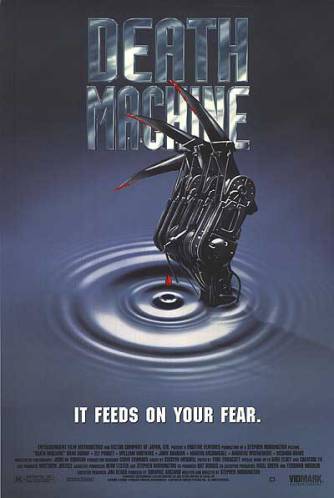
Technically, it only detects your fear.
Like everyone else with internet access and a crippling nostalgia addiction, I ravenously devoured Netflix’s recent offering Stranger Things. My entirely imaginary love affair with Barb aside (girl, I want to exchange notes with you in study hall, but nothing too racy because I know you’re not into it), I enjoyed the series a great deal and look forward to the inevitable second season. More than anything else, though, it got me thinking about the kinds of time travel movies and television allow us to have.
Stranger Things has become instantly and nearly universally beloved by faithfully recreating 1983. And not just upper middle class TV 1983, but grimy, working class, midwestern 1983. A common error when recreating a specific point in the past, is to make everything cutting edge, but Stranger Things gave us a much more realistic take by including holdovers. The decor looked like it was from 1976. One of the moms had Farrah hair. Most of the cars were several years old. The toys had use on them. It was a journey back to a 1983 that actually felt like the time I remembered.
This week’s movie is no Stranger Things. It’s a hell of a lot weirder, but the important thing here is that it features a different kind of time travel for the audience, one that substitutes the comforting glow of instant nostalgia with the campy zeerust of a future that never was. That’s my long-winded way of telling you that 1994’s Death Machine really looked like it was going to come true… for all of five minutes. It was made at the crest of the aimlessly nihilistic cyberpunk wave of the early to mid ‘90s, and unintentionally became a time capsule for every one of that era’s strange preoccupations and predictions.

People wanted to talk to these fucking things for some reason.
In 1994, were positive that megacorporations were going to replace the government (as opposed to just legally buying the politicians they want — thanks, Citizens United!), and free of any kind of social responsibility, would pillage the natural world for raw materials to create new kinds of military technology. In this case, it’s a giant robot gorilla-dinosaur that smells fear, and it’s up to your standard cyberpunk anti-heroic crew of mercenaries, salarymen, and corporate spies to do something about it. There’s even a soupçon of pointless Japan fetishization, as one character plays the part of a dark future samurai. Well, more like a guy who’s seen one too many samurai movies, but still.
The time capsule extends to the styles as well. An executive (played by Rachel Weisz in her first role ever) has an edgy eyebrow ring. The team of environmental activists/possible terrorists sport radical ‘90s fashions, from short painter’s pants in pastel colors, to hair shaved in random patches. The bad guy dresses in a black leather trench coat with greasy Trent Reznor hair, and ripped jeans that used to host a talk show on MTV. Pop culture riffing — never a good idea in science fiction as it instantly dates your project — makes its post-Tarantino presence felt. Most of the characters are named for genre directors, and two just straight-up reference the megacorp from the Alien franchise. This might be the most 1994 movie ever made this side of Reality Bites, but with the added bit of hilarity that it takes place in a cyberpunk 2003.
You’ve probably already figured out I’m not recommending Death Machine with my usual verve. It’s not a terrible movie by any stretch, and when it does veer into badness, it’s a fun sort of badness that’ll make you think of Ecto-Cooler and dino-damage. Stephen Norrington, a special effects man who directed Blade and… um… The League of Extraordinary Gentlemen, took the director’s chair for this one. He also wrote it, which gives what could be a forgettable piece of genre fare a point of view and a certain idiosyncratic style.
But here’s the thing: if I were to elevator pitch this movie, it sounds pretty damn good. It stars Brad Dourif as the creepy bad guy, William “Porkins” Hootkins in a substantial role, and even the first terrorist to be killed from Die Hard who has feet smaller than John McClane’s sister. The climax can best be described as RoboCop vs. RoboPredator. And sure, Rachel Weisz is in it for like 2 seconds, but she is extremely pretty. It might not be a great film, but you’re not wasting your time with it. It lurches back and forth between the self-aware campiness of an era-appropriate sci-fi horror film to the unintentional variety, but it’s never not enjoyable. It shares the most DNA, perhaps, with Richard Stanley’s Hardware, but while that film sports an active cult following, this one does not, despite being demonstrably superior. If only only by virtue of not being set in a single room and featuring a monster more mobile than a recliner.
The monster is a hell of an achievement for a movie like this one. Norrington cut his teeth on the FX crew in the classic Aliens, and there has never been a film before or since featuring better puppets. While the Warbeast in this one can’t compare to the Alien Queen (nothing can), it’s much better than a film of such a modest budget could expect. It’s a credible threat, and Norrington mostly gets around the creature’s limitations with a lot of Terminator-esque PoV shots.
For all its slavish devotion to the time in which its made, Death Machine is somewhat prescient in its choice of villain. Brad Dourif, looking like he was kicked out of Ministry for being, well, Brad Dourif, plays villain Jack Dante as a combination of Grima Wormtongue and that guy in your freshman dorm who really wasn’t good at picking up signals. He is instantly obsessed with heroine of the film, Hayden Cale (another super ‘90s name), even referring to her as his girlfriend, despite her showing nothing but disgust and contempt for him. It feels like a clumsy attempt by Norrington to engage with the thorny issues of stalking, harassment, and entitlement that are only just being brought into the national conversation (mostly because most men think listening to women is a fucking novelty, but I digress). It’s pretty far from perfect, but I’m a believer in supporting people when they try to take a step forward, rather than slapping them down when the step isn’t perfect.
Death Machine isn’t great cinema, but maybe more importantly it is fun cinema. Granted, you’re not going to be enjoying it for all the reasons Norrington wants you do, but who cares? Don’t you want to see a robotic super soldier fight a half-velociraptor half-gorilla machine? Of course you do. You’re reading this.
Filed under: Projected Pixels and Emulsion Tagged: cyberpunk, Death Machine, Now Fear This, Oh god the '90s, Robocop, robogorilladinosaur, the '90s

August 5, 2016
Yakmala: Fantastic Four
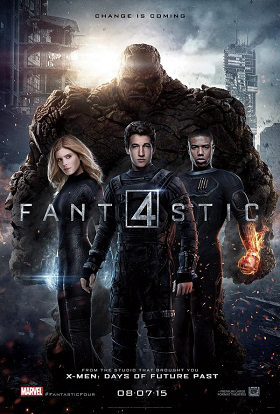
They look like they’re headed for a funeral. And not a fun one.
Time for some real talk: nobody likes dark superhero movies. Oh sure, there’s a subculture out there who longs to pile into a theater and be told how terrible it is to have phenomenal powers, and to be so hot you have to fight off a horde of sex partners using nothing but your massive genitals. But for the rest of us, we like to have fun at the movies. Novel concept, right? Well, it was for Josh Trank, who decided to take one of the most fun comic properties in history and turn it into a mass grave for ducklings.
Tagline: Beyond darkness… beyond fear… lies the fantastic.
More Accurate Tagline: Beyond darkness… beyond fear… lies more darkness and some tedium.
Guilty Party: Josh Trank is so stupid he thinks birthday parties are the ritual sacrifice of cake. He’s so depressing that if you showed him a balloon, he’d wonder how you cut his brother’s head off. Trank sat through Role Models patiently waiting for Paul Rudd to torture and kill McLovin, and wrote an angry tweet to the studio when it didn’t happen. That tweet was so incoherent, Fox wondered why someone wanted to send them a recipe for ham loaf. For some ungodly reason, Fox, who has been holding onto the rights to the Marvel comic Fantastic Four with iron grip of an Amish kid who just discovered internet porn, chose Trank to direct their second stab at a franchise-starting movie. Despite Trank’s background in, apparently, documenting the slow cancer deaths of baby animals.
Synopsis: I don’t want you to get the wrong idea here, reader. I don’t want you to see the word “Synopsis” and think to yourself, “Hey, something happens in this movie.” Because it doesn’t. If this thing was 90 minutes of Josh Trank shitting into a bucket, it would have more value, but then at least you’d have something to show for it.
Reed Richards (Miles Teller) is a young genius, despite the fact that his teacher (who apparently is his only one from 5th grade to 12th) is Homer Simpson. He makes friends with troubled junkyard-dweller Ben Grimm (Jamie Bell), and they learn how to teleport stuff. At the science fair where they unveil this, they get approached by Dr. Franklin Storm (Reg E. Cathey, convinced he’s in a better film), and his daughter Sue (Kate Mara), and recruited to work in their lab. There, they’re joined by Storm’s street-racing son Johnny (Michael B. Jordan) and grouchy foreign genius Victor Von Doom (seriously, who cares at this point?).

So this teleporter Reed built actually goes to another dimension, and with all of them working as a team, they figure out how to get there and back. When the project manager (or something, I was unclear as to who he was, but my ears and eyes were bleeding at this point, so I could have missed it) tells them that they can’t be the first humans to walk on this alternate dimension planet, Reed, Johnny, and Victor get liquored up and decide to go anyway. At this point, Reed decides that, instead of calling up brilliant scientist and computer whiz Sue, he’s going with his weird friend who lives in a junkyard. Even in the original book when Sue’s main job was making everybody dinner and whining, they at least let her go on the goddamn mission. But hey, maybe Reed was afraid of Sue’s menstruation attracting space bears.
Reed, Johnny, Victor, and Ben go to the other side, and that’s when Sue wakes up and is like, “Oh, you silly men.” Everything explodes over there. Victor gets swallowed up in green plasma, Ben gets covered in rocks, and Johnny gets set on fire. When they (minus Victor) come back, Reed is also super stretchy, and in the force of the explosion or something, Sue gets turned partly invisible. Yeah, they get superpowers. Over halfway through the movie.
The scientists keep them in a lab because, well, dude’s on fire. Reed escapes and goes on the run. There’s a one year time jump here because the script wants to invent new ways for you to hate it. Everyone’s learned to use their powers, and Ben is now an emotionally scarred mass murderer for the government.

Good advice, Ben.
They find Reed living in the jungle and everyone hates him now for running away. The scientists need his help to get back to the dimension, because if having one rock murderer is cool, imagine like five or six. So they go back and instead find Victor, who’s now also superpowered and has a cloak. They bring him home and he shows off the power to blow people’s heads up, which is what happens when you show this movie to infants who don’t have a protective layer of cynicism.
Victor decides that he rules this other dimension, and sure, why not? So he’s going to destroy Earth to keep it safe. Okay. Anyway, Reed, Sue, Johnny, and Ben all get together and beat him, but only when they team up. Then they get their own lab and think maybe they should have a name or something.
Life-Changing Subtext: Science really isn’t worth the trouble.
Defining Quote: Sue: “Look at Dr. Doom over here.” I can’t even write that without my eyes vomiting on my keyboard. Whenever some Trump voter decides they want to make a “smart” superhero movie, they have to throw in some winks and nods to the source material, usually with offhand lines like this one. Yeah, the Fantastic Four’s archenemy is a technological-sorcerer dictator named Dr. Doom. This is when I’d explain the refuge in audacity, but then I’d have to define the words “refuge” and “audacity” for the target audience. Probably also “superhero” and “movie.”
Standout Performance: Reg E. Cathey is easily the best part of this, but that basically means he’s summited Turd Mountain and can plant his flag next to all the undigested bits of corn.
What’s Wrong: Over half the film with no powers. The villain wakes up in the end and is like, “Oh yeah, should probably do something evil now.” If this thing had been scored by a policeman’s funeral, it couldn’t have been more somber. The entire movie felt like a Facebook comment starting with the word “Actually.”
Flash of Competence: The casting is pretty good. Teller’s weird dead-eyed robot thing he does works for out-of-control egomaniac Reed Richards. Bell is an unconventional choice for big bruiser Ben, but he’s a good actor. Jordan is always welcome, and Mara’s been good in other things. None of them get a single molecule of help from director or script.
Best Scenes: Victor’s rampage in the end brings the story to life mostly because it’s like, wait, I thought I was watching a superhero movie, and this fucking guy is exploding heads. Really, at this point I was basically some guy listening to Ted Stryker’s life story and I needed something to get me through.
At one point, Reed mansplains the plot of 20,000 Leagues Under the Sea to Sue. Just thought I’d mention it.
When Franklin Storm first finds Victor, he’s living in a garage that looks like it smells like a monkey’s taint. He’s got a bunch of computer monitors in front of him, which is film shorthand for “computer nerd,” as opposed to “guy with too many monitors.” Victor has no accent. None. Later, it’s back! Then gone. This thing is like Punxatawney Phil, although I have no idea what happens if it sees its shadow.
Transcendent Moment: Trank missed the point of the comic so hard, he ripped a hole into another dimension filled with nothing but chinstrap beards and Axe body spray. In the comics, Ben Grimm’s battlecry is the charmingly folksy, “It’s clobberin’ time!” Because of the modern need to explain where everything came from, and the only movie Trank has ever seen is The Crow, he had to shove an angsty origin for that line. It’s what Ben’s brother says before beating him up. Yeah.

No, really. Let’s get to the bottom of their pain.
Here’s the insane thing: if you’re one of six people who likes dark superhero stories, you still should skip this one. It’s not just dark, and stupid, but it’s tedious as well. Not a thing happens. You’re better off reading a comic from the ‘90s. Or, I don’t know, drinking alone.
Filed under: Projected Pixels and Emulsion, Yakmala! Tagged: Depressing, Fantastic Four, Jamie Bell, Kate Mara, Michael B. Jordan, Miles Teller, Puppy Funeral, Yakmala!

July 22, 2016
A Lifetime Roundup
An Amish Murder : Two great tastes that taste great together.
Anna Nicole : A tawdry sex symbol extends her 15 minutes of fame.
On Strike for Christmas : A passive aggressive protest is the best way to celebrate.
Playdate : New neighbors signal trouble for the perfect family.
Flowers in the Attic : The first installment of the Dollanganger saga lacks an identity.
Lizzie Borden Took an Ax : and might or might not have given her mother forty whacks.
The Bad Son : He doesn’t call, he doesn’t write, he murders redheads…
Death Clique : Lesbians are the biggest dangers facing today’s teens.
Petals on the Wind : The second installment of the Dollanganger saga ramps up the crazy.
Blue-Eyed Butcher : Lifetime subverts every trope in this insane true crime story.
The Craigslist Killer : That title is only barely accurate.
Talhotblond : One of the best Lifetime movies out there.
Drew Peterson: Untouchable : Rob Lowe is the King of Lifetime.
PopFan : Lifetime does Stephen King.
The Assault : The cheerleader, the cheerleader, the cheerleader’s on fire!
Grumpy Cat’s Worst Christmas Ever : We’re through the looking glass here, people.
Big Driver : Lifetime does Stephen King, only this time with royalties.
Foreclosed : Jamie Kennedy vs. Marlee Matlin.
Amanda Knox: Murder on Trial in Italy : This whole country’s out of order!
Jodi Arias: Dirty Little Secret : Everyone is a jerk!
If There Be Thorns : The third installment of the Dollanganger saga gets weird.
The Nightmare Nanny : The middle-aged middle-class bogeyman.
A Deadly Adoption : Some of the funniest people on the planet get serious.
Seeds of Yesterday : The Dollanganger saga concludes.
Gone Missing : Sure, we’re just having unexplained psychic powers now.
A Sister’s Nightmare : Lifetime pulls off a halfway decent twist.
Liz & Dick : Lindsay Lohan is Liz Taylor.
Amish Grace : Not as much fun as the title implies.
No One Would Tell : A story from Lifetime’s Mesozoic Era.
Jim Henson’s Turkey Hollow : Thanksgiving is saved by a monster Voltron.
Beautiful & Twisted : Rob Lowe vs. Paz Vega
Virtual Lies : This HotStuff26 might be trouble.
Into Dangerous Territory : Meth bears. You heard me.
Driven Underground : Kristy Swanson flees the mob.
Killing Daddy : Gotta get that sweet insurance money somehow.
In God’s Country : Maybe knock it off with the child brides?
The Wife He Met Online : Oh no, internet dating!
Mother, May I Sleep With Danger? : The classic gets remade with lesbian vampires.
Blue Seduction : The fuck did I just watch?
Enjoy!
Filed under: Projected Pixels and Emulsion Tagged: A Deadly Adoption, A Sister's Nightmare, Amanda Knox: Murder on Trial in Italy, Amish Grace, An Amish Murder, Anna Nicole, Big Driver, Blue Seduction, Blue-Eyed Butcher, Death Clique, Drew Peterson: Untouchable, Driven Underground, Flowers in the Attic, Foreclosed, Gone Missing, Grumpy Cat's Worst Christmas Ever, If There Be Thorns, In God's Country, Into Dangerous Territory, Jim Henson's Turkey Hollow, Jodi Arias: Dirty Little Secret, Killing Daddy, Lifetime, Lifetime Theater, Lizzie Borden Took an Ax, Mother May I Sleep With Danger, No One Would Tell, On Strike for Christmas, Petals on the Wind, Playdate, PopFan, Seeds of Yesterday, Talhotblond, The Assault, The Bad Son, The Craigslist Killer, The Nightmare Nanny, The Wife He Met Online, Virtual Lies

July 15, 2016
Lifetime Theater: Blue Seduction
No, seriously. The fuck did I just watch?
Watch enough Lifetime and your garden variety insanity washes right over you like a soothing summer rain. It takes something truly bananas to even register. In some ways, this ill-advised project has turned me into a junkie, only instead of that sweet horse, I’m in alleyways sucking dick for another hit of some harried scribe’s night terrors. “C’mon, give me a story about catfishing that’s also about anesthesiologists that go broke playing online poker against stray dogs. You know I’m good for it.” What would a Lifetime junkie even wear? A sensible pantsuit and a stained #ImWithHer t-shirt?
Good god, I’ve got problems.
Well, if something like Driven Underground and Killing Daddy is the kind of H you buy from Eric Stoltz when suddenly the drug deal turns weirdly racist for no reason, then Blue Seduction is pure, uncut, black tar heroin. This is the kind of stuff you only get if you’re a warlord. Or it would be if Lifetime movies were a controlled substance, which at this point I think they kind of should be. No, you can get this thing on TV where anyone can watch it, and fall into the delirious rabbit hole that is Billy Zane’s waning career.

Somehow not this.
That was mean. Here’s the thing, I kind of love Billy Zane. I know that’s not something that should be a thing outside of his immediate family, and maybe his buddies from way back. But Billy Zane is secretly one of the best things about any bad movie he’s in, which, unfortunately is most of them. There is a movie so bad that I will never review it, because doing so would make me watch it again, the Adam Sandler “comedy” Going Overboard, which is proof positive that Adam Sandler didn’t suddenly get terrible. It’s more like he accidentally made a couple funny movies in the mid-‘90s. In that interminable film, which is only slightly less funny than puppies with terminal cancer, Zane shows up playing Neptune, the god of the sea, and for a moment, this comedy was actually funny.
That shouldn’t be an achievement, but believe me, it was. It was just as surprising if suddenly Mike Huckabee, out of nowhere, dunked on Lebron James. Nothing in his previous public persona prepared you for that, just like nothing in Going Overboard prepared you for the existence of laughter. Zane hilariously underplays the role as the Roman god of the oceans. He’s Neptune, but he’s not going to make a big deal about it. He kind of realizes how ridiculous he looks, too, but he’s cool with it. Zane exudes this aura that not just is he too cool for what’s happening, so too is the audience. He’s inviting us to laugh with him at him. Long story short, that’s why I’ll get arrested for trespassing on the Zane compound.
He lives on a compound, right? He seems like he’d have to. Or like an emu ranch or something.
Zane brings that same sense of conspiratorial fun to his role as aging rock star Mikey Taylor in Blue Seduction. Zane, whose biggest role was a decade behind him when this aired, had to see the queasy irony of casting him as a has-been. He lurches around the movie, looking slightly puffy in his laying around clothes, a wispy wig poking out of the beanie that might well be surgically attached to his head. He’s the kind of guy that gets recognized only when the muzak version of one of his songs is playing in a supermarket.
Mikey Taylor is under contract to write some new songs, but he can’t, because, you know, has-been. He’s a reformed bad boy now, on the wagon for drugs and alcohol, and married to a former fan who now supports him with her realtor business. In a normal Lifetime movie, she’d be the protagonist too, but she’s not. Why? Because this fucking thing is insane, that’s why.
Anyway, his producer brings in a new singer to help out, and it’s Estella Warren, who was briefly famous around the same time Zane was at his zenith (Zane-ith?). I think she’s supposed to be playing about ten years younger than she actually is, too. I mean, who cares. The point is, she’s a brilliant songwriter, and she’s totally willing to give him the songs. Just as long as he sleeps with her a lot, which they both can do fully clothed. I suspect witchcraft of some kind. Honestly, if the twist had been that she was an honest-to-god broomstick-riding witch with dick-permeable underpants, it would be less batshit than what we got.
She also gets him back on booze and drugs too, which lets Zane do some incredible drunk acting. There’s a scene where Matty (Warren’s character) breaks into his house and puts his hands on her breasts, and Zane mutters, “Boobies.” I’m not saying he’s a comedic genius, but I laughed. It’s funnier than his co-star Adam Sandler’s been in a long time.
So Mikey spirals out of control, and Matty starts fucking other people in his group to get her singing career off the ground. She’s also using Mikey’s wife as a realtor. Oh yeah, and Mikey’s mom — whose acting is so bad she looks like she’s reading off cue cards written by a dyslexic — has a stroke for no reason. Look, I don’t know. I’m just repeating what happened.
The story looks like a slightly deranged version of the Lifetime standard — the other woman tries to replace the wife in the heart of a damaged man. And side note, this thing was made in 2009, so it would help with the modern aesthetic a bit. The locations, though are actually lovely, these stark northern wetlands, and Zane’s house has more character than the later ubiquitous McMansions. Just want to shout out some quality when I see it.
Right, so eventually Matty kidnaps the wife and says she’s going to kill her, and Mikey flips out and goes to rescue her. But it turns out Matty is actually a hitman hired by the wife. Why? Why did she spend half the movie getting him back on drugs and fucking her? Why is she a musical genius? Why? Why?
Who the fuck knows? They stab Mikey to death — in the back! — then tell the cops that it was self defense. And the cops buy it because Estella Warren I guess? Well, all three of them are riding back to the hospital in the ambulance, because those are just noisy taxis now, and Mikey comes back to life. That’s the end. This fucking thing ends with zombies. Zane-bies?
Okay, not really, but it would make more sense. If you’re wondering about the twist, thinking I didn’t set it up enough, well, that’s the movie. This looks like it was written by O. Henry after a bad fall. Or else some harried scribe had to turn it in on Monday and couldn’t think of an ending. Or Zane shrugged and made it up. “Fuck you, I’m a zombie now. Zane, out.”
So what did we learn? If your hit song is called “Flash in the Pan,” you might not be around long. When hiring an assassin for your spouse, maybe pick one who doesn’t have a plan that takes months and months. And if possible, get some of those penis-permeable underpants. Those seem efficient.
Filed under: Projected Pixels and Emulsion Tagged: Billy Zane, Estella Warren, Fucking insane, insanity, Lifetime Theater, madness, what the hell did I just watch

July 8, 2016
Now Fear This: Angel Heart
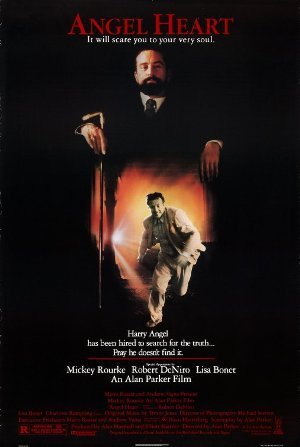
Mickey Rourke, fresh from escaping De Niro’s crotch.
Nowadays, all it takes for a film to be controversial is for the leads to have an insufficient amount of penises. But back before the internet became an outlet for the collective ids of every man who has ever owned or thought about owning a Sailor Moon body pillow, a movie had to do something pretty darn shocking to be considered controversial before anyone had seen a single second of it. While at the time, 1987’s Angel Heart was a Kick Me sign for controversy, it has been largely forgotten today, and that’s a damn shame.
It seems a little quaint now that we might fret over one of the stars of The Cosby Show being seen in a new, disturbingly sexual light. Shit’s changed, now that we know what kind of monster Bill was. At the time, casting Lisa Bonet, known for her role as family-friendly bohemian Denise Huxtable, as a seventeen-year-old frequently topless voodoo priestess who has a rather lengthy, explicit, and blood-splattered sex scene with Mickey Rourke, was not only asking for controversy, it was angrily demanding it.
This scene, in which Rourke — who, we all sort of collectively figured, had this kind of sex anyway — was what Angel Heart was primarily famous for. For good reason too: it’s an operatic performance, something that looks drawn from an Argento picture, a vibrant splash of color against a grimy noir’s grays and blacks. The scene starts out as a relatively standard, if long, sex scene for the day, and remember, in the far more permissive ‘80s, sex scenes were practically required and the fact that one of the participants was seventeen was only brought up in the context that her character was a young single mom. It was with the juxtaposition of violence, first a rain of blood, then an escalation I won’t spoil, that earned it the dreaded X rating from the MPAA. The director cut it down and turned the most extreme act of violence to implication (an improvement), but the damage had been done. This was the movie that was almost X.
While sex scenes are often dismissed as gratuitous (often by people who don’t really know what gratuitous means), this one was definitely not. It was an apotheosis for both characters involved, a moment that damned them both without either understanding how or why. Bonet’s character, the improbably and awesomely named Epiphany Proudfoot, is consistently depicted as an extremely sensual person. She’s also, oddly, an innocent. The character is a paradox, straddling worlds like they were Mickey Rourke or something. She has a frank attitude toward sex, but is always garbed in light colors — often virgin white. Bonet herself is biracial, another two worlds her character has a foot in without being truly accepted by either. She’s a voodoo priestess, but is also the sweetest and gentlest person in the movie, the only one who truly does nothing to deserve the fate that awaits every doomed character in this world.
Angel Heart has an appropriately jaded attitude toward faith. Without exception, religion is depicted as a home for empty promises. Christians are shown as either slack-jawed swamp people or fainting histrionic performers, more concerned with the form of their faith than the function, while the voodoo practitioners are tampering with forces beyond their understanding. In the world of Angel Heart, God might be dead. Probably not, but he isn’t, he definitely doesn’t give a single, solitary fuck about you. The Devil, though… he’s interested. And he’s got stuff that’s priced to move.
The film is structured as a lean noir, taking place in 1955. All noir has twists, and Angel Heart shows its twist up front. In fact, the twist is so painfully, thuddingly obvious, it’s almost a dare to the audience. It’ll make the unwary viewer think he has the film outsmarted, so when the true twist is sprung, it becomes that much more shocking.
What’s the first, obvious twist? Rourke’s beat up PI Harry Angel gets hired on a missing persons case by De Niro playing a long-nailed unblinking freak calling himself Louis Cyphre. Yeah. There’s like one person who didn’t figure that out and had to pick their jaw off the floor with a backhoe. The assignment seems easy at first, but pretty soon the bodies start piling up, and Angel knows he’s dealing with more than he bargained for. The action shifts as well, from the gray-brown streets of New York to the verdant greens of the Louisiana bayou.
Getting back to the pervasive presence, but impotence of Christianity: Cyphre’s preferred meeting spaces are in churches. Oddly, he never appears in any voodoo ritual. The implication then, is that all the power has been stripped out of the Christian church, leaving only a hollow place where the Devil can relax unimpeded. Voodoo is perhaps too alien for even the Devil himself. Or else he knows better than to shit where he eats.
The best horror films featuring Satan as the antagonist always have to set up his involvement with strange and uncanny images. Angel Heart might be at its best when it laying the groundwork in the first act, having Harry run across eerie situations that, while not obviously supernatural, are weird in a way designed to sit in the middle of the uncanny valley: a hooded figure who first appears cleaning up the blood from a suicide, silent nuts who move in unison, vicious dogs at every turn. Images like this help conceal the film’s true twist, which is foreshadowed relentlessly enough — most brilliantly in the form of a pun — that it makes you wonder why you never saw it to begin with. Of course not; a clever soul like you knows Cyphre is the Devil.
While Bonet was the showiest casting (and perhaps ironically, the most dated), the movie belongs to Rourke and De Niro. These days Rourke is known as the comeback kid, taking a body ravaged by an ill-advised combat sports career and disastrous plastic surgery, and using it to craft grotesque protagonists with the pain of the world in every weary movement. Rourke still has his looks here, a combination of the chiseled ideal ‘50s greaser profile with the hangdog character of an old New York bloodline. His charm makes Harry Angel a likable guy, even when he’s doing things like shaking down an old junkie or having rough sex with a seventeen-year-old girl.
De Niro had the opposite career trajectory, and this was before he devolved into lazy self-parody. While the design of his character might be flirting with over the top, De Niro underplays Satan. He sees the Devil has faintly amused by the games mortals play, but also weary of their attempts to outsmart him. De Niro’s Devil always wins his games and doesn’t understand why people don’t understand that. Incidentally, if you were ever wondering who was better, De Niro or Pacino, they both played Satan. Have a look at their diametrically opposed interpretations of the role.
Angel Heart started its life as a controversy in search of a movie. The controversy is gone, leaving only an excellent occult horror noir that deserves to be rediscovered by fans of either genre.
Filed under: Projected Pixels and Emulsion Tagged: Angel Heart, horror, Lisa Bonet, Mickey Rourke, noir, Now Fear This, occult, Robert De Niro

July 1, 2016
Yakmala: Mother, May I Sleep With Danger?

Hang on. Which one’s Danger?
No one movie exemplifies the Lifetime brand in the popular imagination more than the 1996 thriller/melodrama/Tori Spelling vehicle Mother, May I Sleep With Danger? But like any great story, the facts have gotten muddled along the way. The most important being that this wasn’t even a Lifetime movie. Sorry if I rendered any of you unable to trust anymore. If this thing is any indicator, it means you’re all rushing off to sleep with danger.
Tagline: Alone. In love. Afraid. She gave him her heart. Now he wants her life.
More Accurate Tagline: Row for your life, Tori Spelling!
Guilty Party: The early ‘90s featured a spate of horror movies where the monster was ostensibly a normal person. They generally followed the same pattern: main character (often a young woman) meets a new person, and this new person grows steadily more and more insane until they attempt to kill our hero in a blue-tinged apartment building. They were pretty cheap to make and people seemed to like them. Mother, May I Sleep With Danger? was an attempt to make one of those as a vehicle for noted Aaron Spelling relative Tori. When the arguable pinnacle of these is the mediocre Single White Female, you’d think they couldn’t really do that bad. Well, they did. This thing was passed over for distribution and aired on NBC, who is no doubt relieved that while their network is primarily famous for being run by chimpanzees, it at least has pawned of responsibility for this one on Lifetime.
Synopsis: A girl gets dropped off by a handsome guy in a jeep (Lochlyn Munro). She gets on the phone immediately, because its the ‘90s, and tells her friend she’s going to break up with her boyfriend because he’s so dramatic. Yeah, I guess that’s one way to describe it. So about halfway through the conversation, her boyfriend (Ivan Sergei) comes by to give her a gift. Just a heads up: his name is Billy, but I’m calling him Danger. Why? I’m in charge here. You don’t like it, you can… I guess there’s a ton of stuff you can do. Man. That’s a hollow threat.

“Did you know there’s porn on this thing?!”
So Billy flips out and beats her to death with a cutting board. It really is that sudden. The whole time Danger’s got this look on his face like he just ate a bad taco, and he’s not sure if he has time to finish up with this murder before taking care of that.
With murder out of the way, it’s time to meet the protagonist. Sorry, it’s not the girlfriend-murderer. Somewhere, a guy in a fedora just got super upset. It’s Laurel Lewisohn (Tori Spelling) who is your standard movie college overachiever. She offers brilliant book analyses in her lit class, she’s on the track team, she’s doing something that’ll get her sent to China (not as a political prisoner, even!), and she maintains sixpack abs. She’s also falling apart, quitting the track team and still haunted by an eating disorder for like a scene and a half. Pretty sure Tommy Wiseau did uncredited punch-ups of the script.
She’s also dating Kevin Shane, a.k.a. Danger. Danger never learned the difference between a romantic relationship and a hostage situation. Which would be funny if, after every time they had sex, he called the local police with a list of demands. Really, he’s just all about keeping her in a box away from the world. Which you may recognize from the Buffalo Bill School of Romance.

Not a real school.
Mother sniffs this weirdo out within seconds. She picks at a couple inconsistencies in his story and becomes an amateur sleuth. Look, it’s the plot of every Lifetime movie, but we’re watching those tropes be born. Only this is when you realize birth is nothing but an unremitting horrorshow of blood and feces pouring like Immortan Joe just opened up the floodgates. Really, it’s a great metaphor for existence.
Where was I? Right. Danger gets a cabin, locks Laurel away in it. To keep her up there, he lies about getting a phone hooked up and disables her car. If that breaking of her car thing sounds familiar, it’s because it happened in the third Twilight movie. Only that was marketed as a fucking romance.
Eventually, Mother uncovers the murder from the cold open and figures out that Danger is actually Billy Jones. She tries to warn Laurel about it, but Laurel’s like, “Thanks, already figured that out when he tried to put a hatchet in my fucking head.” Laurel attempts to escape via canoe, but Danger can swim. Or possibly even just walk along the shallow pond.
Well, she bops him with an oar, and when he doesn’t come up super obviously for air, she and Mother leave. Oh yeah, your job is done. No way he could hold his breath for two minutes. Or surface under that dock you’re standing on and wait for you to leave.
Which is what happens. The end is him in a new identity (a hilarious mid-‘90s rocker douchebag) getting his new lady, who presumably will start the sleeping-with-danger cycle anew. Like the turning of the seasons.
Life-Changing Subtext: Once you drop a bad guy into water, he is officially someone else’s problem.
Defining Quote: “Where are the car keys?” — Laurel. It looks pretty innocuous, but you really need the acting of Tori Spelling to sell this line. First off, she says this to him after she knows he’s keeping her locked in a cabin without a phone. She knows he’s crazy. Spelling delivers this piece of dialogue like she’s been hanging around with a dead guy and is worried he won’t be considered “the funny one.”
Standout Performance: This movie would not work without Tori Spelling and Ivan Sergei in the lead roles, by which I mean it wouldn’t be fucking hilarious. These two deliver every line as though they memorized them phonetically with looks on their faces like the director is a hungry bear that might attack at any second.
What’s Wrong: It’s a quibble, but Tori Spelling never once asks her mother if she can sleep with danger.
Flash of Competence: This is a bit of a cheat, but I loved how it looks like a Lifetime movie. It’s even shot in British Columbia for that extra level of whatever the opposite of verisimilitude is.
Best Scenes: Really, this whole thing is one best scene after another, but I’ll try to pare the list down.
The real Kevin Shane (Lochlyn Munro, who dropped off the murdered girl in the beginning) returns to town. Danger, who has stolen this guy’s identity — including credit cards, and how has Kevin not worked that out? — “runs into” him at a motel. They get to talking, and because this is suddenly gay porn, Kevin wants to take a shower. So he just sorta does, and Danger follows him in to keep talking. You can probably figure out the end of this scene. And no, he doesn’t fix the cable.
Yeah, Danger kills Kevin and somehow gets the body and jeep out to the wilderness or something. It’s hard to tell since this borrows the Lifetime trick (well, invents it) of shooting everything on someone’s perfectly coiffed lawn. The best part is that Danger has decided what his super-secret body disposal needs is a fucking bonfire. Seriously? Why not shoot off some fireworks? Get yourself one of those flailing tube sock guys!
Later on, when Danger is trying to get back with Laurel, he finds her out dancing with Jax the Nice Guy. He already hates Jax because occasionally Laurel will accidentally hug him, and yeah, that’s as awkward as it sounds. First, Danger kicks the shit out of Jax in the bathroom (not literally, unfortunately), then gets into it with guys outside the club. The funniest part is that he pulls a knife, and I kept hoping it would escalate. Like he chases the one group off with the knife, then the next group he pulls a pistol, then a a shotgun, then a rocket launcher, and suddenly he’s running around with a nuke, being like, “I LOVE YOU 50 MEGATONS WORTH LAUREL!”
Transcendent Moment: Nothing will beat the climactic fight. I mean, she tries to escape in a canoe. Unless you’re Lewis and Clark, just don’t do that. It cheapens this for all of us. But Danger pops out of the water like little Jason Voorhees, and he’s just kind of gingerly shaking the canoe back and forth. And of course the whole thing ends after Laurel taps him with an oar like she’s trying get his attention. This whole thing could have been a fun game of tag and not been shot even slightly differently. It would actually make a little more sense.
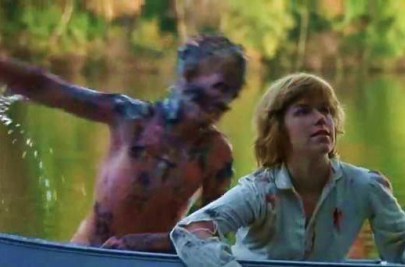
“No, Alice! Don’t sleep with Danger!”
Mother, May I Sleep With Danger? is a classic for a reason. Ironically, they were reaching for a forgettable thriller that might push the careers of the overmatched stars, but in being as inept as it is, the movie has found a lasting audience. Sometimes if you lose hard enough, you end up winning.
Filed under: Projected Pixels and Emulsion, Yakmala! Tagged: danger, Lifetime, lifetime movies, Mother May I Sleep With Danger, Tori Spelling, Yakmala!

June 24, 2016
Lifetime Theater: Mother, May I Sleep With Danger?
If anyone has heard of a Lifetime flick, it’s that one. Mother, May I Sleep With Danger? has become shorthand for the entire Lifetime brand, and features a lot of the elements that are recognizable even to those only casually aware that this network called Lifetime likes to make movies about abused young women. The plot — an obsessive boyfriend insinuates himself into every corner of a woman’s life before turning abusive — sounds like it could be a Madlib for just about any of the network’s offerings. So, it might surprise people to learn it was intended for theatrical release, and originally shown on NBC.
James Franco came up with a highly-stylized adaptation of the story with several changes, the most notable of which was the addition of a bunch of lesbian vampires. It reads a lot like a terrible young adult book series. A specific one, as a matter of fact. The film draws this link directly in the beginning when college professor Ivan Sergei (who played “Danger” in the first and serves as the Greek Chorus for this one) lectures about the mythology of vampires, and young college student Leah comes up with a weirdly feminist, sex-positive (and entirely incorrect, but what are you gonna do?) reading of the first Twilight novel.
Professor Danger’s lecture (fuck you, he’s never named), is more batshittery as he posits Dracula as a queer icon. This completely ignores not only the text of the novel — where Dracula lives with a harem of women and moves to London to prey on more women — but the historical, nativist, and viral underpinnings of the subtext. Sorry, people. Dracula is about racism and tuberculosis, and modern readers should crack a fucking history text before they try any temporal appropriation. Still, it’s an agreeably insane interpretation that dovetails nicely with the modern take on vampires.
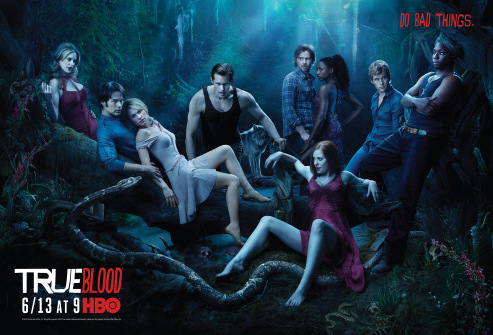
You know, “Dracula.”
“Danger” in this version is young vampire Pearl (yeah, don’t have to read too deeply for the homoerotic subtext there) who we see turned in the very first scene by her girlfriend. Getting turned into a vampire (or nightwalker — the film uses the term, only immediately to follow it up with “vampire,” making me wonder what the point of the term was to begin with) also makes you goth. Which is just one of the excellent flourishes that lets you know nobody is taking this too seriously. Pearl killed the vampire who turned her, and now her three strong coven of vampires wants her to turn a replacement. Otherwise they’ll never get to participate in vampire basketball or something. Pearl is steadily grooming her girlfriend Leah, but has second thoughts when she realizes she’s in love.
Mother (Tori Spelling, also never named) initially objects to the relationship on the grounds of homophobia, but alters her objections when creepy stalker Bob tells her Pearl has dangerous friends. Bob is obsessed with Leah, following her around, asking her out, and eventually drugging and attempting to rape her. He’s an emerging archetype of a modern feminist villain, the Nice Guy, whose toxic entitlement is masked behind a disarming nerdy exterior. Oh yeah, and after that attempted rape, he becomes the Vampire Bob, which is kind of the best thing ever.
Initially, this looked like a campy veneer for one of Lifetime’s most odious of subgenres, the lesbian panic flick. Uh oh, my daughter likes a vagina on her dates, and now she’s going to kill or get killed. I was wary of that from the start, thinking that Franco’s devotion to exploitation would devolve into that. Instead, what I found was a deconstruction of that subgenre, and a precise enough one that says that while they never looked at Dracula, they’ve watched their share of Lifetime. Initially, Pearl is scary and threatening, but her love is ultimately presented as a good thing. The villains are the peers, the homophobic mom (who is depicted as misguided, but ultimately good-hearted), and of course, Bob the Nice Guy. The solution for Leah’s happiness is not to reject being a super gay vampire (or a warning to those who fail to do so), but to go for it. The happy ending is Leah and Pearl ending up as vampires with each other, able to feed on one another without killing humans because of true love.
That’s not to say this isn’t campy. It’s campy as balls (or as ovaries, I should say), reveling in the whole lesbian vampire schtick. The movie features more blood and orgasms than all five Twilight films put together… not hard, since those feature none of either. If this was a theatrical release, Leah’s frank enjoyment of, um, fingersmithing and the gore in the feeding scenes is at least an NC-17. The homoeroticism is happily pervasive throughout. In the play-within-a-play MacBeth, where Leah “stole” the role of MacBeth from Bob (there’s that entitlement again, and appropriately he’s MacDuff), the vampire coven play the witches, because fuck it, why not. In a ridiculously erotically charged prophecy scene, it cuts to the director — played by Franco in his cameo — saying “I didn’t direct that.” It’s a nice wink to the audience, and in point of fact, he didn’t direct any of it. The network was savvy enough to hire a woman to do the honors. Might be why the sex scene had a woman, you know, enjoying herself.
The final scene is a stinger. While Pearl grievously injured all four bad vampires (Bob plus the coven), she didn’t stake them. So when they roll up to a Halloween party dressed like the Purge to hide their scars, they’re continuing their predation. It’s such a weird, audacious ending, you kind of have to love it.
Mother, May I Sleep With Danger? looks like a practical joke. It looks like a ratings stunt, or an ironic hipster foray into the low entertainment of the masses. It might be these things. But it’s also a feminist, sex-positive, and gay-friendly deconstruction of a brand that often flirts with all three. It’s not great cinema, but it’s damn entertaining, sexy, and surprisingly thoughtful
Filed under: Projected Pixels and Emulsion Tagged: james franco, lesbian vampires, Lifetime Theater, Mother May I Sleep With Danger

June 17, 2016
Now Fear This: What We Do in the Shadows
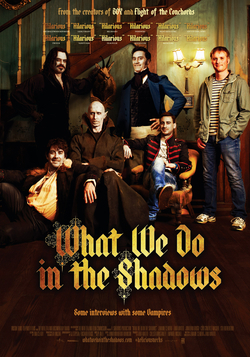
We… pose for group pictures, apparently.
I’m kind of done with vampires. They’re the “Stairway to Heaven” of monsters, overplayed until you don’t even register them as anything but ambient noise. They’ve been stripmined for symbolism and fracked for frights. There’s really nothing left even remotely interesting to say about them, partially because they don’t really mean much anymore. They’ve been adapted and re-adapted so many times, you can almost give them any traits you want. Only the blood-drinking is necessary, and even that changes with every interpretation. Vampires have gone from the defining marquee monster of Hollywood’s Golden Age to the exclusive domain of the hack.
Pop culture has entirely defanged the vampire. They’re about as scary as baby bunnies dressed in tuxedos and about as likely to cause squees in the same demographic. So what’s left? Should we lock them up in the coffin and wait a hundred years for them to become relevant? After all, we should be in the midst of the never ending resource wars that will tear the planet apart by then. Makes sense we’d be scared of creatures who would drink our precious, precious veinwater. That’s what we’ll call blood then. You just watch.
The last stop for any former bogeyman still lingering in a room whose metaphorical lights have been turned on is parody. The same ubiquity that’s robbed vampires of their power to frighten has also made the tropes that built them common knowledge for even the most cave-bound among us. Everyone’s seen at least one vampire movie, even if it was an entry of Twilight , when the understanding of vampires is sort of like what you thought ninjas were back when you were a tyke. The language of the vampire is universal enough for comedy to dwell in the cracks. It’s not like you’re joking about the themes in a few of Virgil’s minor works. You’re talking about vampires, the things that at least one person in your life masturbates to. That shit’s known.
Granted, it helps if the people behind it know comedy. Taika Waititi, owner of my favorite name and director of the upcoming Thor: Ragnarok for some reason, is one half of the writer/director/star duo. The other is Jemaine Clement, familiar to most from Flight of the Conchords and any other time you need a perfect delivery of a deadpan joke in a loopy Kiwi drawl. They play two of four roommates living in contemporary Wellington, New Zealand. And as you probably guessed from the extensive introduction, all four roomies are vampires.
The roommates, cleverly, are from the various eras of vampire entertainment. The oldest is basement-dwelling Petyr, who looks like Count Orlock, spends all his time in a stone crypt and communicates entirely in hisses. Oh, and he refuses to sweep up the skeletons of his victims that accumulate down there. Clement plays Vladislav, the 800 year old Dracula stand-in, but diminished from a run-in with another vampire known as The Beast. Waititi plays the fussy, frilly Lestat equivalent Viago, who really is a sweet, decent guy once you get past the mass murder. Lastly, there’s Deacon, the young (not even 200!) vampire who feels like he could have stepped out of Buffy’s rogues gallery.
The roomies have your standard roommate problems, exposed in a meandering mockumentary format. They argue about chores, who made messes, whose turn it is to bring virgins in to be killed and drained of blood. They also suffer with uniquely undead-related issues. Because they have no reflections, they resort to sketching one another when it’s time to try on outfits to go out. And getting into nightclubs is hell because they have to be specifically invited in. The first half hour is the film’s best: a shaggy, meandering wander through the nightly unlives of four mismatched friends.
Like many comedies, it slows a bit as the machinations of plot take over. Petyr turns a man meant as a meal into a vampire, and this new vampire, Nick, promptly goes around town telling everyone what he is (specifically, the guy from Twilight). In the film’s most inspired running gag, he also introduces the gang to Stu, his mortal pal who teaches the vampires all about the modern world. They all fucking love Stu, a man so pleasant, soft-spoken, and mild you can’t help but love him too.
Okay, maybe the second-best running gag. The werewolves are pretty great as well, with their catchphrase being one of the most inspired pieces of wordplay I’ve heard in a long while. They’re supposedly getting their own spinoff, We’re Wolves, and if it’s half as fun as this one, you’ll be reading about it here. Waititi and Clement are both good enough that I can’t wait to see whatever else the two of them plan to do.
One of my favorite aspects of the film is how intentionally shabby it is. The vampires are lurking in Wellington. Not one of the great, gothic cities of old Europe, or the neon-drenched postmodern hellscape of New York or Macau. The Unholy Masquerade, the event of the year (featuring not just vampires but witches, zombies, and possibly demons… and this year, Stu) takes place in a bland ‘70s-decorated boxy meeting hall with scratched linoleum floors and plastic chairs. The house the vampires live in is large but dilapidated, with water-stained walls, piles of filthy dishes, and the odd collection of old newspapers. It’s never over-decorated in that Rob Zombie way, where a house that should feel accessible is instead a near parody of a haunted house, but a believable dwelling for a group of ageless bachelors whose idea of sweeping is dragging a body down a hallway.
The impressive thing about the film is that we spend ninety minutes with a group of unrepentant murderers and end up kind of loving all of them. Deacon spent the ‘40s as a Nazi. Vladislav thinks the solution to all his problems are slaves and torture. Even sweet Viago can’t eat without turning a room into something out of Kill Bill. But we don’t hate these characters. We’re not rooting for their deaths. Mostly because of how goddamned funny they all are.
What We Do in the Shadows is a worthy companion piece to the similarly-themed Tucker & Dale vs. Evil . While it’s billed as a horror comedy, it’s more accurate to call it a comedy designed specifically to appeal to horror fans. There’s nothing scary about it, but the portrayal of the vampires is reminiscent of the time when vampires were supposed to be frightening. We might not get vampires back as proper monsters, but in this context, they’ll more than do.
Filed under: Projected Pixels and Emulsion Tagged: Jemaine Clement, mockumentary, Now Fear This, Taika Waititi, vampires, What We Do in the Shadows




